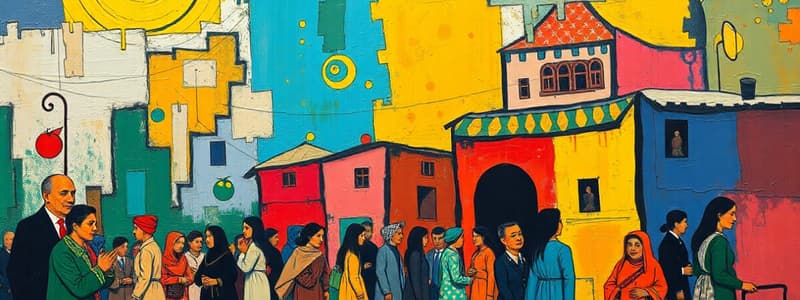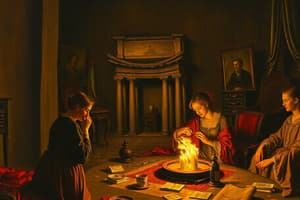Podcast
Questions and Answers
Which of the following best describes the relationship between individual memory and collective memory?
Which of the following best describes the relationship between individual memory and collective memory?
- Individual and collective memories interact and influence each other, shaping personal and shared understandings of the past. (correct)
- Collective memory is formed spontaneously and has no influence on how individuals remember events.
- Individual memory is entirely independent of collective memory, focusing solely on personal experiences.
- Collective memory is simply the sum of all individual memories within a group.
A historian researching a controversial event discovers conflicting accounts from different groups involved. Which ethical consideration is most crucial for the historian to address?
A historian researching a controversial event discovers conflicting accounts from different groups involved. Which ethical consideration is most crucial for the historian to address?
- Prioritizing the account that aligns best with the historian's personal beliefs.
- Focusing solely on the most widely accepted narrative to ensure a cohesive historical account.
- Acknowledging and analyzing the diverse perspectives, biases, and power dynamics that influence each account. (correct)
- Presenting all accounts without interpretation to avoid accusations of bias.
Truth commissions often rely on memory to address past injustices. How can these commissions use memory to promote social justice and reconciliation?
Truth commissions often rely on memory to address past injustices. How can these commissions use memory to promote social justice and reconciliation?
- By focusing solely on the perspectives of the dominant group to ensure a unified national narrative.
- By imposing a single, officially sanctioned memory of the past to prevent dissenting voices.
- By selectively omitting painful memories to avoid further division and promote healing.
- By acknowledging past injustices, providing redress to victims, and promoting understanding between conflicting parties. (correct)
How might the rise of social media and digital archives affect collective remembering and the writing of history?
How might the rise of social media and digital archives affect collective remembering and the writing of history?
How might a nation's collective memory of a war influence its foreign policy decisions decades later?
How might a nation's collective memory of a war influence its foreign policy decisions decades later?
Which process describes how cultural values and traditions are passed down through generations, influencing collective memory?
Which process describes how cultural values and traditions are passed down through generations, influencing collective memory?
What is the purpose of creating monuments and memorials in relation to collective memory?
What is the purpose of creating monuments and memorials in relation to collective memory?
How can the politics of memory affect marginalized groups within a society?
How can the politics of memory affect marginalized groups within a society?
What role does memory play in the process of reconciliation after a period of conflict or division?
What role does memory play in the process of reconciliation after a period of conflict or division?
How can an understanding of memory and identity be used to promote more inclusive and equitable societies?
How can an understanding of memory and identity be used to promote more inclusive and equitable societies?
Flashcards
Autobiographical Memory
Autobiographical Memory
Personal recollections of experiences and events.
Semantic Memory
Semantic Memory
General knowledge and facts we accumulate.
Collective Memory
Collective Memory
Shared memories held by a group, shaping identity and cohesion.
Historical Narratives
Historical Narratives
Signup and view all the flashcards
Cultural Transmission
Cultural Transmission
Signup and view all the flashcards
Commemoration
Commemoration
Signup and view all the flashcards
Trauma and Memory
Trauma and Memory
Signup and view all the flashcards
Memory and Power
Memory and Power
Signup and view all the flashcards
Memory and Justice
Memory and Justice
Signup and view all the flashcards
The Politics of Memory
The Politics of Memory
Signup and view all the flashcards
Study Notes
- Remembering the past is a key part of human thought and culture
- It includes different kinds of memory, historical stories, and cultural customs
- These things help shape who we are, both as individuals and as groups
Individual Memory
- Autobiographical memory deals with personal experiences and life events that you have been through
- Semantic memory involves general knowledge and facts that are widely known
- Episodic memory relates to specific events that include contextual details, like where and when they happened
Collective Memory
- A community, group, or country shares a pool of memories called collective memory
- Collective memory comes from social interactions, cultural habits, and stories from the past
- Group identity, values, and social unity are influenced by collective memory
Historical Narratives
- Historical narratives are accounts of past events which are created through investigation, analysis, and storytelling
- They are subject to the views, prejudices, and goals of historians and other participants
- Collective memory and national identity are largely shaped by historical narratives
Cultural Transmission
- Cultural transmission is how cultural details, beliefs, and behaviors are passed down through generations
- It happens through various means, including spoken stories, written works, rituals, and media
- Continuity of cultural heritage and collective memory is is ensured through cultural transmission
Commemoration and Memorialization
- Acts of remembering and honoring past events or people which include such things as ceremonies, monuments, among other symbolic actions, is Commemoration
- Memorialization is creating physical or symbolic structures that act as continuous reminders of what has occurred in the past
- Shaping collective memory and national identity depends significantly on commemoration and memorialization
Trauma and Memory
- Recollections can be fragmented, twisted, or suppressed due to intensely negative events that greatly affect both individual and collective memory
- Dealing with remembering and understanding traumatic events can be difficult
- Memories and identities of future generations can be molded by trauma that is passed down
Memory and Identity
- Identity, both individual and collective, is closely connected to memory
- A sense of continuity, belonging, and significance is provided as a result
- Current identities can be formed, reinforced, or challenged with one's memories
Memory and Power
- Power dynamics frequently intertwine with memory
- Ruling groups might attempt to manipulate the story of the past which would allow them to justify their dominance while marginalizing those who disagree
- Places of resistance can also be found in memories, where marginalized communities question established narratives and take back their own histories
Memory and Justice
- When seeking justice for historical wrongs, memory is essential
- To acknowledge previous injustices, provide victims with redress, and promote reconciliation, truth commissions, reparations programs, along with other transitional justice procedures frequently rely on memory
- Memory can be used to prevent future atrocities from happening again in the future
Memory and the Digital Age
- How humans create, store, and share memories has been transformed by today's digital age
- Opportunities to preserve and share historical data is offered through digital technologies
- Digital amnesia, misinformation, and memory manipulation are raising new concerns
The Politics of Memory
- The act of using and contesting memory in the public sphere is called the politics of memory
- To further certain political objectives, memory can be used to promote national unity, defend political action, or oppose the established order
- The politics of memory is frequently highly contested. Meaning that different groups compete to control the narrative of the past
Memory and Reconciliation
- After conflict or separation, memory is essential to the healing process known as reconciliation
- By recognizing and remembering the past, wounds can heal, trust can grow, and understanding can be encouraged
- Memory, however, can also cause division if it is used to promote grievances or denigrate the opposition
The Future of Memory
- The future of memory will be shaped by technological, social, and political advances
- Ways that humans experience and interact with the past may be changed by technology like artificial intelligence and virtual reality
- One's idea of themselves and their role in the world will continue to be shaped by ongoing discussions about memory and identity
Important Questions
- How do individual memories and collective memories affect one another?
- In what ways does technology shape and reshape memories?
- What moral issues arise when portraying and interpreting events that occurred in the past?
- How does memory relate to creating identity and seeing yourself?
- How might that memory advance social justice and reconciliation?
Studying That Suits You
Use AI to generate personalized quizzes and flashcards to suit your learning preferences.
Description
Exploration of individual and collective memory, including autobiographical, semantic, and episodic memory. Examination of how historical narratives, shaped by various influences, play a crucial role in society. Understanding memory's impact on identity, culture, and historical interpretation.



